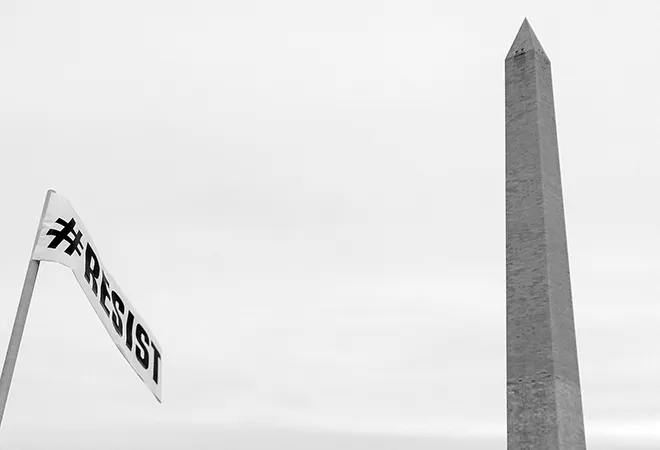 This article is part of the series America on the Ballot.
This article is part of the series America on the Ballot.
At the height of the coronavirus crisis in the United States, Foreign Affairs, a venerable institution of the US foreign policy establishment, devoted its spring 2020 issue to the question, if it was time for America to finally ‘come home.’ Questions about the future of American grand strategy and the global role of the United States were rife ever since Donald Trump ascended to the presidency in January 2017, promising a nationalist populist agenda of America First. Trump’s aggressive rhetoric targeted a ‘globalist’ mindset in support of free trade, international organisations, multinational corporations, and foreign interventions for weakening the United States and hurting ordinary Americans.
Trump’s strategic vision of ‘principled realism,’ combining populist anti-elitism with nationalist anti-globalism was a deliberate repudiation of a Washington establishment consensus on liberal hegemony, military primacy and global engagement, rooted in the belief in American exceptionalism that had guided US national security and foreign policy since the end of the Cold War.
Rather than convincing the Trump administration of the value of global cooperation and multilateralism, the coronavirus pandemic has reinforced the underlying dynamics that inform President Trump’s worldview and political practice, including a post-truth rhetoric of populist polarisation, domestic appeals to nativist resentment and xenophobic nationalism, and the shifting of blame to both foreign and domestic enemies of the ‘people.’ As a consequence of America First and Trump’s mishandling of the federal government’s response to the greatest public health crisis since the Spanish flu, America’s global leadership role has deteriorated to an all-time low.
The coronavirus pandemic has reinforced the underlying dynamics that inform President Trump’s worldview and political practice, including a post-truth rhetoric of populist polarisation, domestic appeals to nativist resentment and xenophobic nationalism, and the shifting of blame to both foreign and domestic enemies of the ‘people.’
Moreover, Trump’s nationalist rhetoric of a ‘Chinese virus’ and public speculations about a Chinese government conspiracy to hide the truth about the origin of the outbreak have heightened the antagonism between Washington and Beijing. For many observers, this heralds a coming struggle for supremacy in the Indo-Pacific, threatening to engulf world politics in a new Cold War.
Trump’s nationalist populism
The populism of America First is predominantly aimed at mobilising a voter base of white, male, working class and non-college educated voters in the South and Midwest of the United States that form the core of the Republican voting coalition. In a series of public opinion polls, longitudinal surveys, and ethnographic studies Trump voters have expressed a combination of xenophobic nativism, economic pessimism and political alienation rendering them susceptible to a nationalist populist rhetoric of anti-establishment resentment and national rejuvenation through protectionism, deregulation, militarised border security, and anti-immigration measures.
America First has reinforced a dynamic of partisan polarisation that has increased continuously since the 1990s, reaching a highpoint under the Trump presidency with figures showing over 80 per cent of Republicans supporting Trump’s signature policy initiative — construction of the US-Mexican border wall — while an even greater number of Democrats oppose it. Republican voters were also twice as likely than Democrats to declare that the coronavirus had been caused by ‘specific people or groups,’ an outlook reinforced by Trump’s blame attribution and conspiratorial speculations on China.
America First has reinforced a dynamic of partisan polarisation that has increased continuously since the 1990s, reaching a highpoint under the Trump presidency.
In his televised address to the American people from the Oval Office on 12 March 2020, the American President deliberately framed the novel disease as an external threat, referring to a ‘foreign virus,’ and in subsequent statements a ‘Chinese virus.’ Trump’s initial framing of the pandemic reiterated key features of his America First discourse, including a preference for unilateralism, a policy course of immigration and border restrictions, and a pronounced hostility towards the European Union (EU) and China, both which Trump had targeted previously for supposedly unfair trading practices that disadvantaged the United States.
Trump’s deployment of ‘strategic racism’ thus followed an established pattern of populist polarisation and nationalist blame attribution. In associating a global health issue with a threat to national security emerging from beyond America’s borders, Donald Trump shifted political responsibility for the devastating social and economic impact of the pandemic from a delayed, fragmented and inadequate federal government response to the intransigence and disinformation campaign of the Chinese Communist Party (CCP).
Approval ratings of the President’s response to the coronavirus rose to 87% among Republicans at the end of March 2020 — compared to 26% of Democrats and 51% of Independents.
In attacking the ‘political correctness’ of the Democratic Party and ‘fake news’ media for accusing the President of racism and xenophobia, Trump, at the same time, once again branded his domestic opponents as ‘enemies of the American people.’ Approval ratings of the President’s response to the coronavirus rose to 87% among Republicans at the end of March 2020 — compared to 26% of Democrats and 51% of Independents — confirming the polarising appeal of Trump’s populist rhetoric and policy performance.
Washington vs. Beijing: Cold War 2.0?
In vilifying China, Trump embarked on a risky reelection strategy seeking short-term electoral gain at the price of a further strategic deterioration of Sino-American relations. Domestically, opinion polls seemed to support Trump’s calculus, indicating that views of China were turning increasingly negative in the United States following the coronavirus outbreak, with two-thirds of Americans holding an unfavourable view of the country in March 2020. American fears and anxieties vis-à-vis China were a mixture of economic concerns regarding job losses and trade imbalances and socio-political hostility towards Chinese records on human rights and environmental degradation.
Previously, Trump had repeatedly praised President Xi Jinping in person — including initially for Chinese efforts to combat the virus — and oscillated between more cooperative and confrontational public stances, for example, on trade issues.
China’s power and influence were clearly seen as threatening the United States, with 62 per cent of Americans viewing Beijing as a ‘major threat’, a significant increase of 14 percentage points between 2018 and 2019. Capitalising on this mood, an email to supporters from the President’s re-election campaign unequivocally stated: “America is under attack — not just by an invisible virus, but by the Chinese.”
Previously, Trump had repeatedly praised President Xi Jinping in person — including initially for Chinese efforts to combat the virus — and oscillated between more cooperative and confrontational public stances, for example, on trade issues. Trump’s earlier flip-flopping on China had also reflected a wider schism between outspoken national security hawks like Secretary of State Mike Pompeo and Deputy National Security Advisor Matthew Pottinger and the generally more pro-China oriented wing around Treasury Secretary Mnuchin and Chief Economic Advisor Larry Kudlow. Trump’s hardening rhetoric on China in response to the coronavirus, however, seemed to indicate a more lasting policy shift towards the position of the former camp. An assessment further supported by a growing chorus of American media, national security experts, the Pentagon, and members of Congress in both parties stressing renewed US efforts to confront Chinese hegemonic ambitions, politically, economically, and militarily.
Neoconservatives branded by Trump in the run-up to the 2016 election as part of a failed Washington establishment, saw their policy positions on reasserting American global primacy vindicated.
In line with America First’s emphasis on rebuilding American military dominance and a global strategic environment of great power competition, the 2017 National Security Strategy had already identified China as a ‘revisionist power’ and strategic rival, further building on the limited counter-balancing of Obama’s much-vaunted ‘pivot to Asia.’ Neoconservatives branded by Trump in the run-up to the 2016 election as part of a failed Washington establishment, saw their policy positions on reasserting American global primacy vindicated, some joining forces with avowed American nationalists like Steve Bannon, Trump’s former White House Chief Strategist.
Any predictions about a coming struggle for global influence and regional supremacy, however, have to be measured against enduring realities of global economic interdependence, geopolitical and military-operational conditions existing in the Asia Pacific, and the limited appetite of America’s allies, both in Europe and Asia, for an open confrontation with Beijing. In seeking a new Cold War with China, both for domestic reasons and to reassert its damaged international reputation, America First might very well result in America alone.
The views expressed above belong to the author(s). ORF research and analyses now available on Telegram! Click here to access our curated content — blogs, longforms and interviews.



 This article is part of the series
This article is part of the series  PREV
PREV


